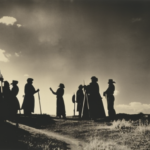One-line Summary:
In “Second-Hand Time,” Svetlana Alexievich explores the collective memory and experiences of post-Soviet Russia through a series of interviews, revealing the complex and often painful transition from communism to capitalism.
Life in the Soviet Union:
“Second-Hand Time” delves into the lives of ordinary people living in the Soviet Union, capturing their hopes, dreams, and struggles under the communist regime. Through a series of interviews, Svetlana Alexievich paints a vivid picture of life in a society where individuality was suppressed in favor of collective ideals.
The author explores the impact of the Soviet Union’s collapse on its citizens, revealing the disillusionment and loss experienced by many. She highlights the stark contrast between the grand promises of communism and the harsh realities faced by the people. The interviews provide a glimpse into the hardships endured, such as food shortages, censorship, and the constant fear of political persecution.
The Transition to Capitalism:
As the Soviet Union crumbled, Russia underwent a tumultuous transition to capitalism. Alexievich captures the confusion and uncertainty that accompanied this shift, as people struggled to adapt to a new way of life. The interviews reveal the challenges faced by individuals as they navigated the complexities of a market economy and grappled with the loss of social safety nets.
The author explores the rise of the oligarchs and the growing wealth inequality in post-Soviet Russia. She highlights the corruption and exploitation that became rampant during this period, as well as the disillusionment felt by many who had hoped for a better future. The interviews shed light on the human cost of this transition, as individuals found themselves marginalized and left behind in the pursuit of profit.
Collective Memory and Identity:
“Second-Hand Time” also delves into the collective memory and identity of post-Soviet Russia. The interviews reveal the deep nostalgia for the Soviet era, despite its flaws, as many long for the sense of purpose and community that was lost. Alexievich explores the ways in which individuals grapple with their past and reconcile their memories with the present reality.
The author also examines the impact of historical events, such as World War II, on the national psyche. She explores the trauma and resilience of a nation that has experienced immense upheaval throughout its history. The interviews provide a platform for individuals to share their personal stories and reflect on the broader implications of their experiences.
Key Takeaways:
- The Soviet Union’s collapse brought about a tumultuous transition to capitalism, marked by corruption, inequality, and disillusionment.
- Individuals grapple with their memories of the Soviet era, longing for a sense of purpose and community that was lost.
- The interviews shed light on the human cost of the transition, as many individuals found themselves marginalized and left behind in the pursuit of profit.
- Historical events, such as World War II, continue to shape the collective memory and identity of post-Soviet Russia.
“We were the first to build a society of workers and peasants, the first to build a society without God. And we were proud of it.”
In “Second-Hand Time,” Svetlana Alexievich provides a poignant and insightful exploration of post-Soviet Russia. Through a series of interviews, she captures the hopes, dreams, and struggles of ordinary people living through the collapse of the Soviet Union and the transition to capitalism. The book serves as a powerful reminder of the complexities of history and the enduring impact it has on individuals and society as a whole.












